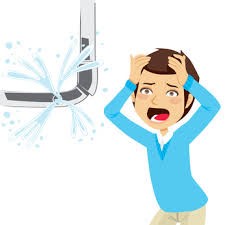How to Deal with Frozen Pipes

Cold weather puts added stress on people and structures. We want to stay warm and avoid frostbite and conversely buildings want to stay warm and avoid frozen pipes.
Why do pipes burst?
Water has a unique characteristic that is responsible for all the fuss. When liquid water changes to solid water (ice) it becomes less dense. This is why ice floats. The solid form of most substances is denser than its liquid form, so most solid materials will sink in the same liquid. The density of water actually decreases by about 9% when it freezes. Looked at another way, the water is expanding as it freezes. This expansion creates tremendous pressure if the water is confined to a fixed space, such as plumbing. No matter how strong the plumbing is, this expansion force will move the plumbing, often resulting in cracking.
Frozen plumbing generally does not leak at the time of rupture since the water is frozen. The subsequent flooding in the structure occurs when the ice melts enough to allow flow of liquid water to and out of the rupture.
How do we prevent our plumbing from freezing, and what should we do if freezing occurs?
Preventing freezing should be easy, just keep the water in our plumbing systems above 32 degrees Fahrenheit. Life unfortunately is not always easy. When the temperatures plummet and the wind blows a significant amount of heat will be lost in buildings. Much of our plumbing is hidden in wall or ceiling cavities. These cavities will generally be colder than the living spaces.
To keep plumbing warm you should:
- Keep the building warm, above 60 degrees
- Open doors to closets or cabinets if plumbing runs in these areas
- Be sure all areas of the building are getting heat – if a forced air system is available keep the fan running
- Allow a slow trickle of water through susceptible plumbing
- Add additional heat to areas that get cold, such as the bonus room over the garage
If in spite of your best efforts some of your plumbing does freeze, it is important to make sure the water stays there. There are only 2 scenarios: first, the plumbing freezes without causing a rupture; and second, the plumbing freezes and does cause rupture(s). If your plumbing freezes and the damaged areas are hidden from view, the only way to find out what happened is to get the water flowing again. We recommend having a plumber help you with this, however, you should follow the general steps below:
What to do if plumbing freezes:
- Identify your main water valve. During the thawing process you should have someone ready to shut this off if water leakage occurs
- Try to identify plumbing sections affected by checking water flow at all access points
- Identify secondary shut offs that can be used to minimize leakage, and possibly keep unaffected areas useable
- Add heat to the affected area – if you are using an electric device be sure it is properly grounded and be prepared to de-energize it if water starts flowing
- If water starts to flow shut off the supply
- All damaged/leaking plumbing will need to be identified and repaired. This may take a number of attempts if multiple ruptures have occurred
Once all of the leaks are fixed you will need to be sure the structure is properly dried to minimize any additional water damage.
